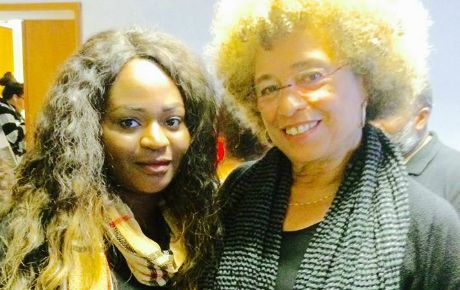
During her visit in Stockholm earlier in September Angela Davis met a group of Black Feminists to share knowledge about racism in contemporary society and discuss anti-racist strategies. Feministiskt perspektiv Rosie Koyeni has generously shared a summary of the discussions.
BLACK FEMINIST ROUNDTABLE DISCUSSION WITH DR ANGELA DAVIS, CIVIL RIGHTS ACTIVIST, FEMINST and EDUCATOR
SUMMARY OF YESTERDAYS DISCUSSIONS!
Yesterday, some Afro-Swedes met with Dr. Angela Davis in an open exchange of knowledge, to discuss the local and global implications of fighting black racism in modernity.
Although the two hour session was organised as a round table discussion, attendees present were eager to hear from Dr. Davis’ own personal experiences of politics, organising, anti racist strategies and existing methods that can be replicated and used in advancing the needs of black people, living in Sweden.
The session started off on a pleasant note, the discussion was lively, almost all participants looked relaxed, connections were made amongst those present and there was an almost immediate free flow of information. Individuals in the room spoke from a place of honesty and sincerity and it was immediately clear that, all those who were present in the room wanted the same thing, to live in an equal society that is free from racism and all its ills.
Initially, Dr. Davis chose not to speak but opted to listen to the participants who willingly shared their thoughts on the prevailing situation in Sweden and the effects thereof, on the Afro Swedish community – Dr. Davis later made the painstaking effort of responding to each and every individual comment and/or question that was made in the room.
Popular sentiment in the room spoke to individual challenges of living in Sweden while emphasising existing barriers to doing anti racist work in a country that vehemently denies the existence of racism and insists that race is nothing but a social construct. While the majority of white Sweden could be viewed as tolerant, the fact that they subscribe to the racist notion of a ’non-racial’ society invariably invalidates the lived realities of Afro-Swedes.
The perception of Sweden’s own moral standing as a tolerant, non-racist and gender egalitarian state also creates barriers and blocks honest and constructive dialogue on race from taking place. It can therefore be argued that, although white culture shelters most white Swedes from confronting their own privilege – it also acts as an enabler to the current permeating levels of structural and institutional racism in the country. Recent events however, like the rise in popularity of the racist party, Sweden Democrats (SD) now means that, continued denial and silence over the existence of racism in Sweden is no longer an option.
In responding to some of the comments and questions, Dr. Davis, spoke to the group about the importance of the organising and mobilising of Afro-Swedes through knowledge exchange and political preparedness while maintaining the moral even when things appear to remain stagnant – in referencing antiracists movements today, such as Black Lives Matter, she emphasised the importance of being prepared so that, when injustices that captivate global attention occur, the Swedish black anti racist movement will be ready to effectively utilise opportunities for change.
She also reiterated that, in order for activists to be successful in fighting racism during these modern times, all those concerned need to gain a broader and deeper understanding of the complexity of racism in modern times, something which prior generations that stood as vanguards against racism in the 1950s and 1960s did not have to do. Dr. Davis spoke to the need for building parallel institutions whilst ’infiltrating’ existing ones, she equally emphasised the need and importance of having black people in positions power.
The rest of the conversation was organic and participants shared strategies about how to challenge power structures, the importance of unity, transnational collaborations within and outside Europe, Africa and the Americas etcetera. Dr. Davis also shared with the group her own personal work in the United States particularly her work with the feminist, prison abolitionists and civil rights movements.
Dr. Davis pointed out the dangers of mobilising movements along emerging issues, she insisted that activists must always have long term strategies and goals or the flexibility to revisit set demands in order to remain effective and relevant. She also debunked the notion that activism cannot be done in different spaces where were individuals often spend most of their time, be it work or other wise.
It was also equally interesting to hear her speak about the voices of women in different movements and she bemoaned the fact that most women’s voices are silenced while that of their ’charismatic’ male leaders are amplified. She made reference to Rosa Parks who prior to the freedom rides had been a well experienced and respected civil rights organiser who did other important but dangerous work that has never been acknowledged until now, such as, investigating the rape of coloured women by white men in the South.
Dr. Davis also briefly spoke about her current work that seeks to improve living conditions for incarcerated transgender women,in particular, trans women of colour who are disproportionately affected by hate violence at the hands of both state and non-state actors. Violation of black trans women’s bodies speaks to a deeply imbedded racist society that seeks to violate all those that do not ’fit’ and are considered ’other.’
The Swedish anti racist, feminist group has their work cut out for them.
